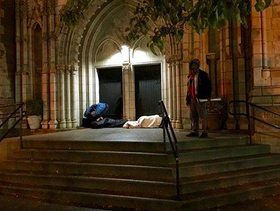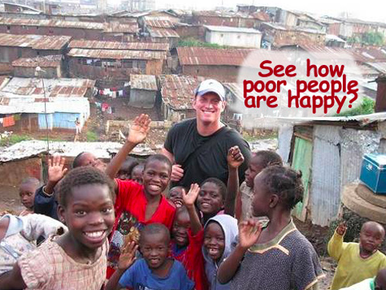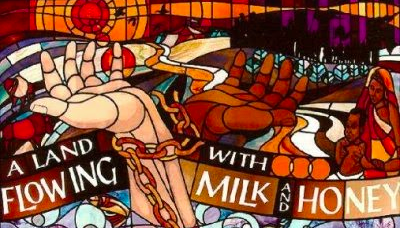 I am reading or have read recently a number of books that seek to explain how we arrived at our very distinct demographic and mostly ethnic divisions that exist today—urban, suburban, and now exurban. (I will leave the rural landscape for others who have studied it more adequately.) Amid these books I am also learning how we have developed a functionally dependent class, mostly non-white, that live and try to survive in the most dense urban areas of our country. Much of what I have read affirms my own writing on the subject, which found its way into chapter 5—“Idolatry and Poverty: Social Action as Christian Apologetics”—of my book, Wasted Evangelism: Social Action and the Church’s Task of Evangelism. Below is a three-part adaption of the latter subsections of this chapter. Idolatry promotes a defective social reality for the non-poor Christian In his Nature and Destiny of Man, Reinhold Niebuhr observed that idolatry is making the contingent absolute, something relative into “the unconditional principle of meaning.” Luke Timothy Johnson points out that, when we consider something as ultimate, this is worship, not just what our lips or cultus ritual render, but in the exercise of our freedom in service to that which we consider absolute and unconditional, and, thus, derive our significance. It is, however, not just an image fashioned with gold and silver that provides the danger and potential of idolatry, for the Bible is clear, such man-fashion idols are no-things (Isa 41:21–24; 44:10; Ps 115; 135; Acts 14:15; 1 Cor 8:4; 10:19; Gal 4:8). Johnson reminds us that “important idolatries have always centered on those forces which have enough specious power to be truly counterfeit, and therefore truly be dangerous: sexuality (fertility), riches, and power (or glory).” It is the body of knowledge that accompanies the object and the habits of service in worshipping the objects (i.e., idols) and, then, the social and cultural habits that follow that develop an everyday “world,” with meaning and definitions for relationships (repeated action, mundane habits), that objectifies reality and maintains significance and plausibility (its symbols and corresponding institutions). Our socially constructed world, then, is reality formed by our service of worship and sustained (validated) through the habits and experience of everyday life.
However, to understand fully the non-poor’s everyday reality, it is simply “not enough to understand the particular symbols or interaction patterns of individual situations.” It is how the “overall structure or meaning” within “these particular patterns and symbols” are experienced. As we seek to apply the gospel that is embedded with texts regarding idolatry (e.g., the overwhelming number in Mark’s own gospel) and, as well, texts indicative of relationships toward the economically vulnerable, it is important to understand how the social-location experienced by many non-poor Christians was formed and its implications for their (i.e., the non-poor) participation in the outcomes of this social-location. Religion once offered an integrating principle that helped provide a “life-world” that was “more or less unified.” But, modern life not only provides a less unified everyday life, now religion often aligns itself with the socio-economic forces that help sustain the plausibility of our faith, which can then inoculate the non-poor Christian from the idolatrous forces embedded in their social-location. Over time new symbols and signs (lawns, yards, gated communities, commutes and highways, social status, shopping malls, upward mobility, the market, double-entry accounting, etc.) that permeate the social-location the modern non-poor Christian experiences as everyday life compete with biblical symbols (e.g., the words of God, the cross, redemptive-historical acts of God in history, etc.). Johnson reminds us, “Prior to any action or pattern of actions we might term ‘Christian’ is a whole set of perceptions and attitudes, which themselves emerge from a coherent system of symbols, and an orientation toward the world and other humans, which we call Faith.” In fact, the very habit of experiencing the fragmented, often unintegrated social-locations over and over everyday might feel like freedom bestowed by our socio-economic system, but actually weakens the plausibility of biblical faith to inform our home world. Non-poor Christians are in danger of idolatry when finding themselves in need of affirming “this worldly” system and its institutions as God-given in order to be at home, plotting their lives on the societal map provided by social institutions rather than biblical discipleship in order to relate—comfortably, plausibly, securely—to the overall web of acceptable meanings in society. As Berger in Homeless Mind points out, because of the plurality of social worlds—work, school, play, third places, highways, commutes, home, shopping, church—in modern society “the structures of each particular world are experienced as relatively unstable and unreliable.” The separated sectors of our social world are rationalized and relativized, forcing the non-poor Christian to justify religiously this worldly system and institutions in order to feel less exposed and vulnerable and more relevant and secure. After decades of political alignment and religious justification, for the most part, the non-poor Christians living in the suburbs now feel at home.
0 Comments
While attending an early morning men’s prayer and devotional time (as a guest of the one leading the study component), I was horrified by some of the strained thoughts on the passage. The study leader actually tried to stick to the James text; it was the poor rich readers that made comments to lessen the impact of what God was saying through James' words in chapter 5 of his letter. Here are some of my thoughts as the poor rich readers of the Bible commented on James’ words:
Some might not think it, but I was being charitable here. My thoughts were a bit more harsh and even more direct than what I penned above. I will grant that it took me eighteen years after becoming a Christian to begin to see how suburban, affluent, and political I had been reading the Bible--all the while thinking I was interpreting rightly. We need to stop taking the poor out of the texts that actually call us to judgment for not doing something for the poor--neutrality, distance, time, politics will not be allowed as excuses on that day God judges all of our hearts. For on "that day" our riches will have rotten and our garments will have become moth-eaten. Our gold and our silver will have rusted; and their rust, on that day, will be a witness against us and will consume our flesh like fire.
Dangerous Sunday Morning Devotion: Can’t benefit from the milk if your can’t handle lactose8/16/2015
A while ago, I was reading a novel about the investigation of a mysterious plane crash. It was a great read. Enjoyed it immensely. It was entitled Crashers, written by Dana Haynes. “Crashers” is the name given to Go-Teams who are sent in immediately to investigate airline plane crashes, leading experts from specific fields vested in determining the cause of the crash, so it never happens again. In the midst of the storyline, a character, not necessarily religious, ponders a rather curious thought that got me thinking about the church and the poor. She said, "Land of milk and honey . . . Bloody lot of good it does if you can’t handle lactose and you’ve got diabetes to boot."
 Church leaders should, at least, question who benefits and who does not benefit from current church structures and bureaucracies (i.e., church life and function). The building-centered and business-centric models that most contemporary church-systems emulate can result in duplicitous habits, which can be suggestive of a protective posture for its leaders and for the cultural status quo. Our ways of doing church are not neutral. The temple system into which the gospel is introduced in the New Testament, as well as its leadership, were antithetical to the arrival of the kingdom that had been inaugurated by Jesus’ arrival. Perhaps it is not the construction of temples or the development of religious bureaucracies per se, but the energy and resources used to maintain these systems that promote the status of their own authorities and stakeholders, which can distract (to put it blandly) from a church’s responsibility toward the poor. Rather than laboring to maintain current church systems and structures, contemporary church leaders need to promote the church’s responsibilities to the poor. Otherwise, they may replicate the social and cultural location described throughout the Gospels and the Acts of the Apostles. The cost of doing church business and maintaining church bureaucracies are not neutral to the church’s role as advocates for the poor. This includes the allocation of human, financial, and social capital available in and through a church or a consortium of churches for use in the public square. Such allocations of financial and human capital could be used for advocating and caring for the economically vulnerable and the poor. The resources and capacity of the local church need to be evaluated, not by our contemporary cultural expressions of church life, but in terms of the kingdom of God, which certainly includes addressing the causes of poverty and advocating for the poor. Andrew Davey, in his book Urban Christianity and Global Order, insists that a church concerned about “its own sustainability must have strategies other than the growth paradigm” (p. 112). Contemporary church growth models are multimillion-dollar business ventures with huge marketing campaigns and an elite celebrity leadership of its own that promote costly expectations for a local church. There should be consideration whether such growth expectations divert resources and human capital away from a church’s responsibilities regarding the poor. While a church’s sustainability should be directed outward and toward the future, it should also have positive, redemptive consequences for the community, with special consideration for its vulnerable populations. Adapted from chapter 1 of Wasted Evangelism, "Widows in Our Courts (Mark 12:38–44): The Public Advocacy Role of Local Congregations as Discipleship."
 Sometimes we should be deeply impacted by a text of Scripture, not so much as an encouragement or a comfort, but seriously scaring us to death. We are conditioned to seek solace, comfort, encouragement, even exhortation, in the Bible. We are told and, perhaps, have taught others to hold on to its promises. But, this is only half right. We should be consoled by texts meant to console, yet scared to death by texts meant to slay us. Ephesians 3:1-13 is one such text of Scripture (despite most preachers never presenting this path of relevance or application from this pericope of Paul’s words–at least to my knowledge). “For this reason I, Paul, a prisoner for Christ Jesus on behalf of you Gentiles—assuming that you have heard of the stewardship of God’s grace that was given to me for you, how the mystery was made known to me by revelation, as I have written briefly. When you read this, you can perceive my insight into the mystery of Christ, which was not made known to the sons of men in other generations as it has now been revealed to his holy apostles and prophets by the Spirit. This mystery is that the Gentiles are fellow heirs, members of the same body, and partakers of the promise in Christ Jesus through the gospel.” Here some of my thoughts that arise from Paul’s words to the church in Ephesus:
I recall, now too many years ago to acknowledge, telling some bible college students that were complaining about the rule that all hats, including baseball caps, were to be taken off inside a campus building: “If you can’t take off those caps now, what makes you think you’ll be able to die for your faith in some god-forsaken land when all indication seems to indicate that God has abandoned you?”
If you are a Christian (especially a Christian leader), you shouldn’t be able to read Ephesians 3:1-13 with any measure of comfort either—and it should scare the hell out of you, as well. The question remains, nonetheless, where will you go? To whom will you go to? With whom will you live and ministry so that all, that is those now outside the church, may have access to the Father?
 We do not typically approach the subject of evangelism and social action impartially, but with political, demographic, and religious preconceptions and biases. Opening up a conversation to re-assess the nature of evangelism is difficult, especially when social action and issues of poverty are injected into the discussion. The intent of Wasted Evangelism is not to debate the subject, or to review the history of the various positions regarding evangelism and social action, but to offer an exegetical and biblical theological approach to the question, Can social action be evangelism? It is important, nonetheless, to recognize there are barriers that can militate against an open discussion on the subject of evangelism and social action. For many, the meaning of evangelism is self-evident because of its association with “proclamation” activities (e.g., preaching, proclaiming, witnessing, etc.). Evangelism’s etymological relationship to the term “good news” (i.e., the evangel) can box one into defining evangelistic activity as passing on information, that is, to tell, preach, or share the news of Jesus Christ—that is, to evangelize. For many conservative evangelical Christians defining evangelism any other way causes the gospel (i.e., the news) to lose its meaning, robs the people of this important information, and diminishes the work of salvation in Jesus Christ. Evangelism’s strong association to the news of the gospel suggests to some that anything outside verbal, cognitive-based activities is a threat to the fundamentals of the faith. Additionally, those who have the highest interest in evangelism are often those least interested and least skilled in critical, theological reflection. Since evangelism is understood as a self-evident activity, rarely is the subject examined exegetically or evaluated theologically, but is usually consigned to matters of practical theology (e.g., missions, preaching, personal witness, church outreach programs, and church growth). (Meaning is often confused with application.) This, then, does not promote biblically relevant criteria to precede the discussion and, thus, limits the possibility of new, creative, and potentially sound understandings of biblical evangelism. Within evangelical circles, to advocate that social action can be evangelism is challenging, for such subjects as poverty and the poor are often relegated to the private sphere. Therefore, anything related to the public arena of rights, laws, and taxes or the confronting of social or governmental systems on behalf of the poor are often associated with the “social gospel” and the theologically liberal church. Although historically the church was deeply involved with issues of poverty, a “great reversal” took place between 1900 and about 1930. Evangelical fundamentalists turned away from their social responsibilities as a reaction against the social gospel that was perceived to be aligned with liberalism, which had diminished Bible infallibility and inspiration and weakened biblical views of sin, hell, salvation, and the deity of Jesus. When civic and political social concerns became suspect in the minds of evangelical academics and popular revivalists, social action responsibilities took on a minor role for much of the evangelical Christian community. Anything associated with the social gospel was considered a distraction and, to some, a betrayal to the fundamental essence of the gospel (i.e., the information, that is, the news of Jesus Christ). This history spills over into any contemporary discussion on evangelism and social action. There are also demographic barriers to an open discussion regarding the association between evangelism and social action. Over the last seven decades, people have been moving out of urban centers and into the suburbs, including Christians and their churches. The twin demographic forces of urban flight and suburban sprawl contribute to the evangelicals’ disassociation with issues of poverty and the poor. As a result, this social transformation helped reinforce a one-dimensional understanding of the gospel [see note below], which determines, for many, the nature of evangelism. Suburbanization of American society has moved much of the evangelical communities of faith outside populations affected by poverty. Rather than church communities promoting social action on behalf of poorer communities, the (upward) mobility of American families toward the suburbs demand that suburban churches serve a socializing and stabilizing function. Not a very likely set of social forces that will generate social change on behalf of the economically vulnerable hidden outside their neighborhoods and unknown within their circles of friends and acquaintances. The barriers reviewed here are not exhaustive, but are limited to those most relevant to the arguments and conclusions of the studies found in Wasted Evangelism. To overcome these barriers, these studies focus our attention to the text of Scripture, particularly the Gospel of Mark, as a basis for entering into a discussion on the biblical relationship between evangelism and social action. *From the "Introduction" to Wasted Evangelism. [Note] A one-dimensional gospel indicates solely a person/God dynamic relationship; whereas a multi-dimensional gospel includes the person/God dynamic and, also, creation/God, person/creation, and person/person. Wasted evangelism considers the multi-dimensional gospel more representative of a biblically sound narrative definition of the gospel. |
AuthorChip M. Anderson, advocate for biblical social action; pastor of an urban church plant in the Hill neighborhood of New Haven, CT; husband, father, author, former Greek & NT professor; and, 19 years involved with social action. Archives
February 2024
Categories
All
|
Pages |
More Pages |
|


 RSS Feed
RSS Feed